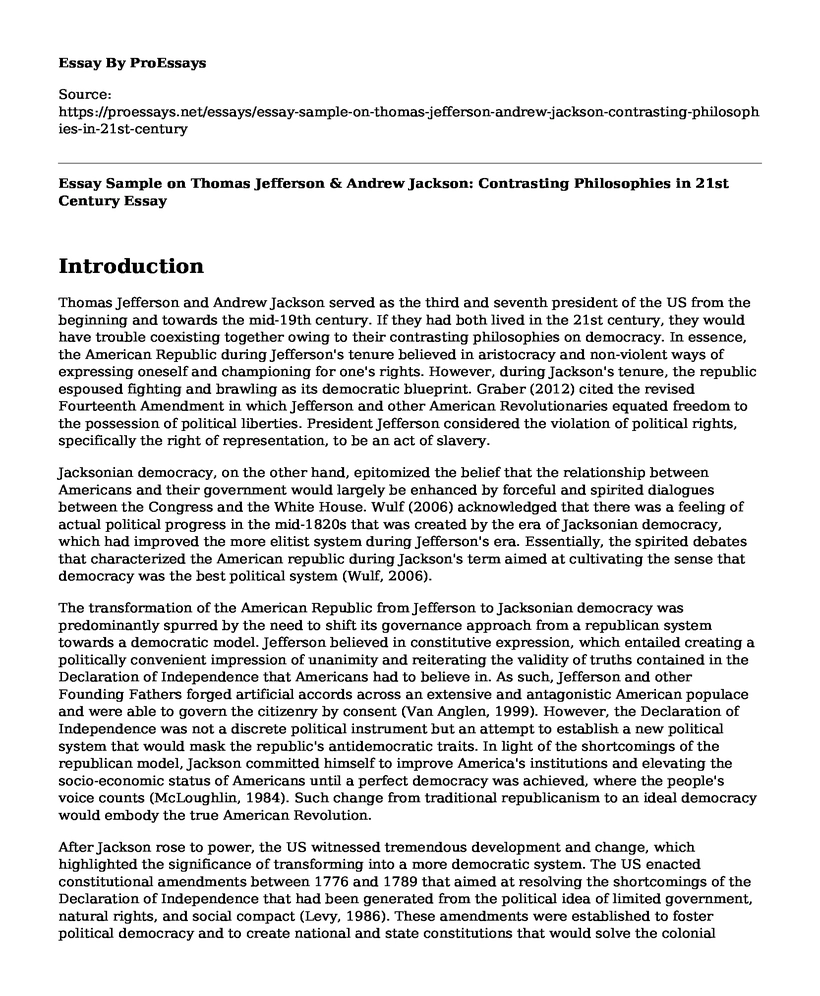Introduction
Thomas Jefferson and Andrew Jackson served as the third and seventh president of the US from the beginning and towards the mid-19th century. If they had both lived in the 21st century, they would have trouble coexisting together owing to their contrasting philosophies on democracy. In essence, the American Republic during Jefferson's tenure believed in aristocracy and non-violent ways of expressing oneself and championing for one's rights. However, during Jackson's tenure, the republic espoused fighting and brawling as its democratic blueprint. Graber (2012) cited the revised Fourteenth Amendment in which Jefferson and other American Revolutionaries equated freedom to the possession of political liberties. President Jefferson considered the violation of political rights, specifically the right of representation, to be an act of slavery.
Jacksonian democracy, on the other hand, epitomized the belief that the relationship between Americans and their government would largely be enhanced by forceful and spirited dialogues between the Congress and the White House. Wulf (2006) acknowledged that there was a feeling of actual political progress in the mid-1820s that was created by the era of Jacksonian democracy, which had improved the more elitist system during Jefferson's era. Essentially, the spirited debates that characterized the American republic during Jackson's term aimed at cultivating the sense that democracy was the best political system (Wulf, 2006).
The transformation of the American Republic from Jefferson to Jacksonian democracy was predominantly spurred by the need to shift its governance approach from a republican system towards a democratic model. Jefferson believed in constitutive expression, which entailed creating a politically convenient impression of unanimity and reiterating the validity of truths contained in the Declaration of Independence that Americans had to believe in. As such, Jefferson and other Founding Fathers forged artificial accords across an extensive and antagonistic American populace and were able to govern the citizenry by consent (Van Anglen, 1999). However, the Declaration of Independence was not a discrete political instrument but an attempt to establish a new political system that would mask the republic's antidemocratic traits. In light of the shortcomings of the republican model, Jackson committed himself to improve America's institutions and elevating the socio-economic status of Americans until a perfect democracy was achieved, where the people's voice counts (McLoughlin, 1984). Such change from traditional republicanism to an ideal democracy would embody the true American Revolution.
After Jackson rose to power, the US witnessed tremendous development and change, which highlighted the significance of transforming into a more democratic system. The US enacted constitutional amendments between 1776 and 1789 that aimed at resolving the shortcomings of the Declaration of Independence that had been generated from the political idea of limited government, natural rights, and social compact (Levy, 1986). These amendments were established to foster political democracy and to create national and state constitutions that would solve the colonial problems.
Nonetheless, it was the transformation spearheaded by the Jacksonian democracy that would catalyze the achievement of the constitution's objectives. For instance, Wulf (2006) argued that the introduction of universal white manhood suffrage during Jackson's era created a feeling of actual political advancement, which was characterized by frequent celebrations of democracy being the most suitable political model. The achievement of political equality that was envisioned by the framers of the Declaration of Independence came into fruition during Jackson's terms, which was the reason why the American Republic during the antebellum period was considered to exemplify a nation of progress. Such milestones, thus, set the US on a path towards constant democratic improvements.
References
Graber, M. A. (2012). Subtraction by Addition?: The Thirteenth and Fourteenth Amendments. Columbia Law Review, 112(7), 1501-1549. Retrieved from https://search-ebscohostcom.lopes.idm.oclc.org/login.aspx?direct=true&db=a9h&AN=84014731&site=ehost-live&scope=site
Levy, L. W. (1986). Constitutional History, 1776-1789. Society, 24(1), 30-39. Retrieved from https://searchebscohostcom.lopes.idm.oclc.org/login.aspx?direct=true&db=s3h&AN=10974692&site=ehost-live&scope=site
McLoughlin, W. G. (1984). Religious freedom and popular sovereignty: 1730-1830. Union Seminary Quarterly Review, 38(3-4), 319-336. Retrieved from https://search-ebscohost-com.lopes.idm.oclc.org/login.aspx?direct=true&db=rfh&AN=ATLA0000939989&site=ehost-live&scope=site
Van Anglen, K. P. (1999). "The Lightning from the Sky and the Sceptre from Tyrants": Religion and the American Enlightenment. Religion & the Arts, 3(2), 248. https://doi-org.lopes.idm.oclc.org/10.1163/156852999X00178
Wulf, N. (2006). The Politics of Past and Progress in Jacksonian Democracy. ATQ, 20(4), 647-658. Retrieved from https://searchebscohostcom.lopes.idm.oclc.org/login.aspx?direct=true&db=a9h&AN=23901963&site=ehost-live&scope=site
Cite this page
Essay Sample on Thomas Jefferson & Andrew Jackson: Contrasting Philosophies in 21st Century. (2023, Mar 26). Retrieved from https://proessays.net/essays/essay-sample-on-thomas-jefferson-andrew-jackson-contrasting-philosophies-in-21st-century
If you are the original author of this essay and no longer wish to have it published on the ProEssays website, please click below to request its removal:
- The Problem of Freedom and Determinism - Paper Example
- Ethics Review: Bioethicists and Ethical Principles Paper Example
- Issues of Identity Essay Example
- Essay Example on Political Fallacies
- Video Analysis Essay on The Mystery of Storytelling
- Unlocking the Power of Self-Identity: Exploring Individual Behaviors - Essay Sample
- Free Paper Sample: Canon's Code of Ethics







